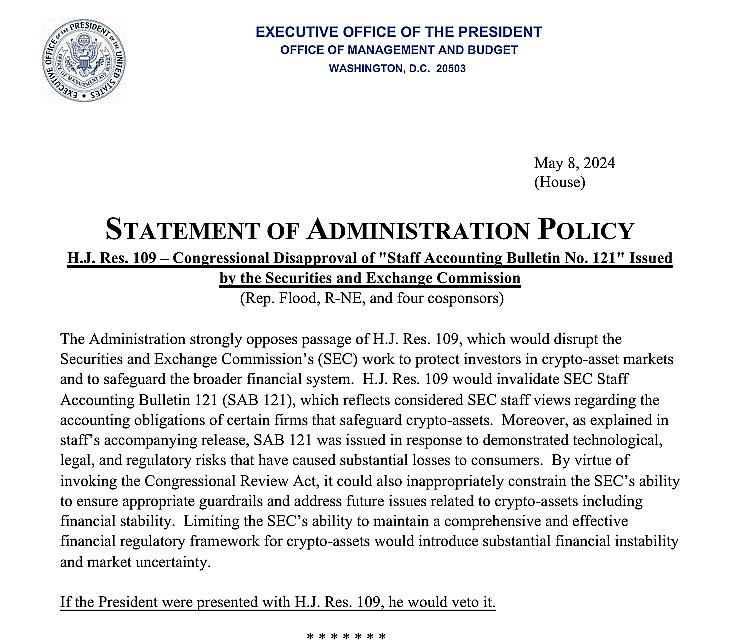As an experienced financial analyst following the cryptocurrency regulatory landscape, I’m closely monitoring the recent developments regarding H.R. 4763 and H.J. Res. 109. The Biden Administration’s opposition to these legislative actions is a clear indication of their commitment to striking a balance between fostering innovation in the digital asset market and ensuring robust consumer protections and financial stability.
During a pivotal week for cryptocurrency regulations, the Biden Administration has expressed its disapproval towards two significant legislative moves that could impact the digital asset market. The first is the House of Representatives’ passage of H.R. 4763, or the Financial Innovation and Technology for the 21st Century Act. The second development involves the advancement of H.J. Res. 109, a joint resolution that seeks to overturn SEC’s Staff Accounting Bulletin No. 121 (SAB 121).
Opposition to H.R. 4763
H.R. 4763, initiated by Rep. Thompson (R-PA) and supported by eleven other representatives, aims to redefine the regulatory structure for digital assets in the US. This bill passed the House on May 23, 2024, marking a significant move by legislators to tackle the rapidly expanding field of digital currencies and assets.
The Biden Administration has made it clear that they disapprove of the current version of the bill. They have advocated for a more equitable solution that includes robust consumer and investor protections. The Administration is open to working with Congress to create legislation that encourages innovation, while also providing solid safeguards. Their statement underscores the importance of taking additional time and engaging in further dialogue to establish a regulatory framework that effectively shields those involved in the digital asset market.
Veto Threat on H.J. Res. 109
At the same time, the administration announced its intention to reject H.J. Res. 109 should it arrive at the President’s desk for approval. Introduced by Rep. Mike Flood (R-NE) and co-sponsored by Rep. Wiley Nickel (D-NC), this joint resolution seeks to invalidate SAB 121 using the Congressional Review Act. Issued by the SEC, SAB 121 compels financial institutions and firms to report digital assets such as cryptocurrencies on their balance sheets. However, many regulated entities find this requirement excessively costly, which might hamper their capacity to provide crypto custody services.

As a crypto investor following the regulatory landscape, I can tell you that while there’s a possibility that H.R. 4763 could be passed into law, according to the Biden administration, H.J. Res. 109 is predicted to be vetoed.
On May 8, 2024, House Joint Resolution 109 was approved in the House with a vote of 228 for (contributed by 207 Republicans and 21 Democrats) versus 182 against (from all Democratic representatives). Supporters contend that repealing SAB 121 will lead to increased availability of crypto services via regulated entities, eliminating the balance sheet requirement, and ultimately strengthening consumer safeguards.
The Biden Administration firmly rejects the passage of this resolution. They argue that it could hinder the Securities and Exchange Commission (SEC) in its mission to protect investors and preserve financial stability within the crypto-asset sector. The administration points out that SAB 121 was a reaction to the inherent risks in technology, law, and regulation that have historically resulted in substantial investor losses. Overturning this directive, as suggested by the resolution, would weaken the SEC’s ability to establish crucial safeguards and address future risks in the crypto market.
Legislative Implications
As I analyze the current legislative landscape, the approaching Senate consideration of H.J. Res. 109 introduces an added level of intricacy due to the potential for a presidential veto. The administration’s unwavering position on both H.R. 4763 and H.J. Res. 109 highlights the delicate equilibrium required between promoting financial innovation and implementing thorough regulatory supervision.
The consequences of these legislative decisions will have a profound impact on the future direction of digital asset regulation in the US. They will influence how financial institutions handle, secure, and create new offerings in the crypto sector. As all parties involved, including lawmakers, regulators, and industry players, work towards finding solutions to the complex issues at hand, it is crucial that a cooperative and balanced approach be adopted.
Currently, the administration’s firm stance indicates a prudent approach moving forward, with a focus on safeguarding consumers and maintaining market equilibrium as digital financial technology undergoes significant advancements.
Read More
- Does Oblivion Remastered have mod support?
- Thunderbolts: Marvel’s Next Box Office Disaster?
- To Be Hero X: Everything You Need To Know About The Upcoming Anime
- 30 Best Couple/Wife Swap Movies You Need to See
- DC: Dark Legion The Bleed & Hypertime Tracker Schedule
- Clair Obscur: Expedition 33 ending explained – Who should you side with?
- Summoners War Tier List – The Best Monsters to Recruit in 2025
- Elder Scrolls Oblivion Remastered: Best Paladin Build
- Clair Obscur: Expedition 33 – All Act 3 optional bosses and where to find them
- Skeet Ulrich Reportedly Set to Return For ‘Scream 7’
2024-05-25 13:00